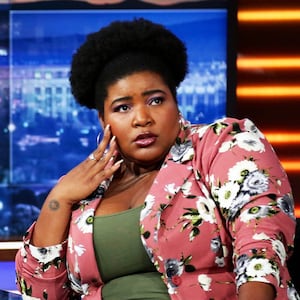When Michael Kosta filmed his new stand-up special almost a year ago, he says, “I didn’t think that people would be watching just because they’re going, ‘Oh wow, it’s nice to go somewhere different.’”
Detroit. NY. LA., which premieres on Comedy Central on Friday, Dec. 11 at 11 p.m., traces the comedian’s career path, from starting out in his native Michigan to getting his first big breaks on The Tonight Show in Los Angeles and then The Daily Show in New York, where he is currently the sole white male correspondent.
“I always prided myself on being someone that could make different audiences laugh no matter where I was,” Kosta tells me on this bonus episode of The Last Laugh podcast. “I thought that was the definition of a stand-up comic. If I’m on a cruise ship, if I’m at a funeral home, if I’m at a kids’ show, my job is to make everybody laugh everywhere.”
He would see comedians who only did well on the coasts, or only did well in the middle of the country and deliberately set out to make sure he could do both. “Sometimes in ‘real America’ you’ll get people laughing at the joke because they just heard a word—not because they’re understanding the joke,” Kosta explains. “And then sometimes in ‘fake America’ or coastal America, you get people laughing because they think it’s smart—not because it’s actually funny.”
In the new special, he says growing up in Michigan and touring all over the country made him less surprised than most of those coastal elites were by Trump’s victory in 2016.
That Election Night he was performing at the Comedy Store in Los Angeles where people were “weeping in the streets” about the outcome. The next day, he says he performed in Erie, Pennsylvania, where people were “weeping with happiness.” This time around he expected Biden to win but was “surprised at how close it was.” He adds, “I was surprised that 70 million people have lived through these last four years and said, yes, let’s do more of that.”
Despite his position on The Daily Show, Kosta tries to stay away from politics as much as possible in his stand-up act. On a scale of George Carlin to Steve Martin, he likes to exist on the sillier end of the spectrum. Hence a bit about how Leonardo DiCaprio is always wet in his movies and another about how people take anything and everything from their house when they’re traveling by car.
“Both George Carlin and Steve Martin made me laugh,” he says. “I’m trying to be me and not be either one of them, but I don’t want to be a lecturer up there. I want people to leave feeling like they had a good time.”
Highlights from our conversation are below and you can listen to the whole thing right now by subscribing to The Last Laugh on Apple Podcasts or wherever you listen to podcasts.
On being ‘The Daily Show’s’ token white guy correspondent
“For a while there, they had like five white male correspondents, you know? And I think about that now and I go, ‘How did they even pick who did what?’ Now, with me, if there’s a white guy story, I know I’m going to get it! Look, the show evolves, the show adapts, the show is taking on the point of view of its host. Trevor [Noah] is not a white guy. He’s not a white American male. He’s showcasing his point of view, which is different than most other TV hosts right now. Did I have to say to The Daily Show, after five or six sketches, ‘Hey, can I not get kicked in the balls on this one?’ And they were like, that’s not because you’re white, that’s because you’re new. But I also understand the tall, white, hetero guy being the butt of the joke is also just funnier sometimes.”
How he felt when ‘The Daily Show’ went virtual in March
“I did not think it was smart, what we were doing. I said, ‘Are you guys out of your mind?’ You know, we’re all in tiny New York apartments. Some of us have good internet, some of us don’t. And I was completely wrong. I mean, part of the momentum that we got was because Trevor and the executive producers said, why would we stop? I like an audience. I want an audience. There’s a reason I got into stand-up, not making YouTube videos. So I have to admit, I filmed some of these pieces and as I’m sending the files, I’m thinking, this is terrible, this is not funny. And then they piece it together and it’s like, ‘Oh, OK, it worked.’ But it is strange. When I spoke to Trevor in the very beginning, I said, how are you doing over there, man? And he was like, ‘It is the strangest comedy experience of my life.’ So it is strange, but I like money and I also like eating and if this is how we try to make people laugh now, I’m OK with it. As long as it’s temporary.”
How he thinks late-night comedy shows will change post-Trump
“I think the general population somehow thinks that comedy can’t exist without this guy in office. These are professional comedians, these are professional comedy writers. They can make a situation funny no matter who’s in office. In fact, it almost feels like low-hanging fruit sometimes when you really just have to showcase the tweet and it gets a laugh. It almost feels like we’re just aggregators. We’re just like pulling the funny clip and seeing if we can repeat it. Even as a stand-up, people are going, ‘Oh, now that you don’t have Trump, what are you gonna talk about?’ I would much rather talk about packing drunk or trying to wash your hands when the faucet doesn’t work or living with your parents. I think those are more universal and more funny than this internet troll who became president.”
Next week on The Last Laugh podcast: ‘Big Mouth’ star Jason Mantzoukas.



